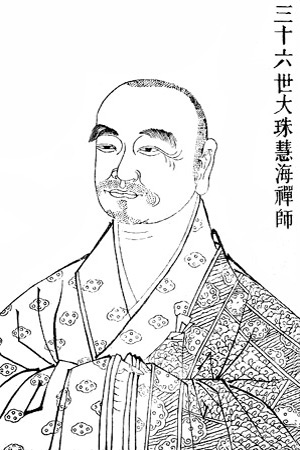ZEN IRODALOM ZEN LITERATURE
« Zen főoldal
« vissza a Terebess Online nyitólapjára

大珠慧海 Dazhu Huihai (fl. 788; 713?-812?)
頓悟入道要門論 Dunwu rudao yaomen lun
(Rōmaji:) Daiju Ekai: Tongo nyūdō yōmon ron
(English:) The Path to Sudden Attainment
(Magyar átírás:) Ta-csu Huj-haj: Tun-vu zsu-tao jao-men lun
# 卍 Xuzangjing Vol. 63, No. 1223 頓悟入道要門論
# CBETA Chinese Electronic Tripitaka V1.7 (Big5)
http://www.cbeta.org/result/normal/X63/1223_001.htm
Tartalom |
Contents |
Huj-haj történeteiből PDF: Huj-haj a Hirtelen Megvilágosodásról |
The Zen Teaching of Instantaneous Awakening Entering the Tao of Sudden Enlightenment PDF: Shastra on the Importance of Entering the Path of Sudden Enlightenment PDF: Jinhua Jia on Huihai, p. 61. Chan Master Yuezhou Dazhu Huihai DAJU HUIHAI
|
"Huihai" and "Huaihai"
Daiju Ekai (大珠慧海 Dazhu Huihai ?-788) and Hyakujō Ekai [百丈懷海 Baizhang Huaihai 720-814)
The modern Zen master Osho in his illuminating book Hyakujo: The
Everest of Zen, with Basho's Haikus, somehow combines both of
these two different Zen masters, melding their two stories into one.
Although not exactly faithful to the record of Chan, Osho simply
reads what his editors have put in front of him, and manages in his
inimitable way, to make it all make sense--weaving his own
interpretations into Hyakujo (the Japanese pronunciaton of
Baizhang), who seems to have for the moment swallowed Dazhu
Huihai whole in this contemporary retelling of the never ending story
of the Zen search. The British author and Buddhist seeker, John
Blofeld wrote a book, The Teachings of Hui Hai, one of the earliest
English language attempts at translating a Chinese Chan master's
record. This book is on Dazhu Huihai, and is included in Osho's
Books I Have Loved. This may be part of the confusion of Osho's
editors and sutra writers for his discourses--i.e., they think "Huihai" is
"Huaihai"(just a small 'a' difference). But still, in the true Zen sense,
the truth is One, individuals are simply waves on the ocean, and the
real "Great Matter" is beyond facts, names, and dates. Is that right?
![]()
Huj-haj történeteiből
Fordította: Terebess Gábor
Vö.: Folyik a híd, Officina Nova, Budapest, 1990, 25. oldal
– Minek jöttél ide? – kérdezte Ma-cu Huj-hajtól.
– Buddha tanítását keresem.
– Énnálam? – kérdezte Ma-cu. – Ilyen messzire kódorogsz otthonról, ahelyett, hogy saját házad kincsével törődnél?
– Mi az én kincsem?
– Aki kérdez! Mindennel teljes az, hiánytalan. Használhatod korlátlanul, kimeríthetetlen. Miért magadon kívül keresed azt, aki keres?
Huj-haj egyszerre megvilágosult.
Egy Jüan nevű szerzetes azt kérdezte:
– Mester, teszel-e valami komoly erőfeszítést, hogy gyakorold az Utat?
– Igen – mondta Huj-haj.
– Mit?
– Ha éhes vagyok, eszem – ha álmos vagyok, alszom.
– Hát nem ezt tesszük mindnyájan?
– Nem bizony.
– Miért nem?
– Ha esztek, közben száz dolgon jár az eszetek, és ha aludni tértek, ezer gondolattól terhes az elmétek – mondta Huj-haj. – Hát ezért nem.
PDF: Huj-haj zen tanítása a Hirtelen Megvilágosodásról
Buddhista Misszió, Budapest, 1987 [Házi soksz.], 103 oldal
Első rész: Huj-haj Zen tanítása a hirtelen megvilágosodásról, 11-55. oldal
Második rész: Cung-csing feljegyzései [宗鏡錄 Zongjing lu; Jpn.: Sūgyō-roku] a Nagy Gyöngyszemnek is nevezett Huj-haj zen mesterről, 57-103. oldal